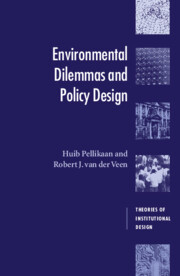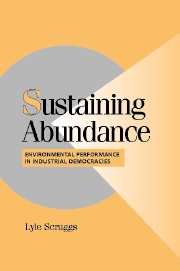Environmental Dilemmas and Policy Design
$146.00 (C)
Part of Theories of Institutional Design
- Authors:
- Huib Pellikaan, Rijksuniversiteit Leiden, The Netherlands
- Robert J. van der Veen, Universiteit van Amsterdam
- Date Published: September 2002
- availability: Available
- format: Hardback
- isbn: 9780521621564
$
146.00
(C)
Hardback
Other available formats:
Paperback, eBook
Looking for an examination copy?
If you are interested in the title for your course we can consider offering an examination copy. To register your interest please contact [email protected] providing details of the course you are teaching.
-
This book examines environmental policy-making through research into individuals' reaction to environmental issues. It is often assumed that people are reluctant to contribute to environmental protection, because they do not see it as in their interests. The authors argue that self-interest is just one of a number of motives which affect people's choices, and that voluntary environmental polices are thus more likely to succeed than might be expected. They base their arguments on detailed surveys of public opinion.
Read more- Detailed survey-based study of people's attitudes to environmental protection and cooperation in collective action, and the tension between self-interest and moral commitment in social dilemmas
- Empirical application of rational choice theory
- Assessment of the viability of non-coercive environmental regulation
Reviews & endorsements
"This is social science at its best. Instead of taking casual looks at very important concepts, they have teased apart an important foundation of modern social science theory, and developed a large data set that enables them to examine piece by piece this important concept. What a gem!" Elinor Ostrom, Indiana University
Customer reviews
Not yet reviewed
Be the first to review
Review was not posted due to profanity
×Product details
- Date Published: September 2002
- format: Hardback
- isbn: 9780521621564
- length: 262 pages
- dimensions: 229 x 152 x 19 mm
- weight: 0.56kg
- contains: 25 b/w illus. 28 tables
- availability: Available
Table of Contents
Preface
Part I. Background:
1. Environmental pollution as a problem of collective action
1.1. Can something be done?
1.2. Environmental dilemmas and the logic of collective action
1.3. Surveying environmental dilemmas from the actor's perspective: rational choice
1.4. How motives speak to preferences
1.5. Non-equivalent dilemmas and reported behaviour
1.6. Policies of self regulation in the Netherlands
1.7. Moral commitment in environmental dilemmas: conditional or unconditional?
1.8. Determinants of cooperation in environmental dilemmas and policy design
2. A Dutch approach: self regulation as a policy concept
2.1. Introduction
2.2. Dutch environmental policy and the idea of self regulation
2.3. The social instruments
2.4. An environmental ethos and the social dilemma
2.5. Self regulation: compliance-oriented or virtue-based?
3. The actor's perspective on collective action
3.1. The subjectivity of the actor in rational choice theory
3.2. Problems of collective action
3.3. Social dilemmas
3.4. The actor's perspective
Part II. The Survey:
4. Preference orderings and measurement
4.1. Three potential social dilemmas
4.2. Measuring preference orderings
4.3. Three different environmental problems
4.4. Avoiding response effects
5. Rational choice
5.1. Conditions of rational choice
5.2. The dominance rule of rational choice
5.3. Choice of strategy
5.4. The robustness of the dominance rule
5.5. Conclusion
6. Consistency of motives and preferences
6.1. A model of reasoned choice
6.2. The motives of Valuation and Willingness
6.3. The test of consistent preferences
6.4. Consistent preferences in the three cases
6.5. Does motive-preference consistency matter?
6.6. Conclusion
7. The non-equivalence of the cases
7.1. Hard and easy cases of the dilemma
7.2. The model of the hardest case
7.3. The scalability of the cases
7.4. Conclusion
8. Reported behaviour
8.1. Determinants of behaviour
8.2. The sociocultural model
8.3. An alternative model
8.4. From motives to behaviour
Part III. Conclusions: Theory and Policy:
9. Do people accept self regulation policy?
9.1. Introduction to Part III
9.2. Acceptance and agreement
9.3. The acceptance of legal regulation and self regulation
9.4. Conclusion
10. Do people agree with the environmental ethos?
10.1. Introduction
10.2. The two stages of the environmental ethos
10.3. Knaves, pawns or knights?
10.4. The ethical interpretation of motives and preferences
10.5. The agreement response
10.6. Acceptance and agreement: overview
11. Moral commitment and rational cooperation
11.1. Ranking preference orderings
11.2. The meta-ranking approach
11.3. Enlightened self-interest and moral commitment
11.4. Consistent preferences in the meta-ranking
11.5. An environmental meta-ranking
12. Reciprocity and cooperation in environmental dilemmas
12.1. The puzzle of unconditional cooperation
12.2. The reciprocity thesis
12.3. Cost of cooperation and conditionalities in environmental dilemmas
13. Assessing self regulation policies
13.1. The context of environmental dilemmas
13.2. Consistent ethical cooperation
13.3. Background features of hard and easy cases
13.4. Mapping problems and the salience of the environmental ethos
13.5. Individual cost and collective gain
13.6. Comparing motives in the polar cases
13.7. The dimension of private significance
13.8. Self regulation policy: symbolic or real?
13.9. A non-moralistic approach to environmental responsibility
13.10. Self regulation in proportion to facilitation
Bibliography
Index.
Sorry, this resource is locked
Please register or sign in to request access. If you are having problems accessing these resources please email [email protected]
Register Sign in» Proceed
You are now leaving the Cambridge University Press website. Your eBook purchase and download will be completed by our partner www.ebooks.com. Please see the permission section of the www.ebooks.com catalogue page for details of the print & copy limits on our eBooks.
Continue ×Are you sure you want to delete your account?
This cannot be undone.
Thank you for your feedback which will help us improve our service.
If you requested a response, we will make sure to get back to you shortly.
×





